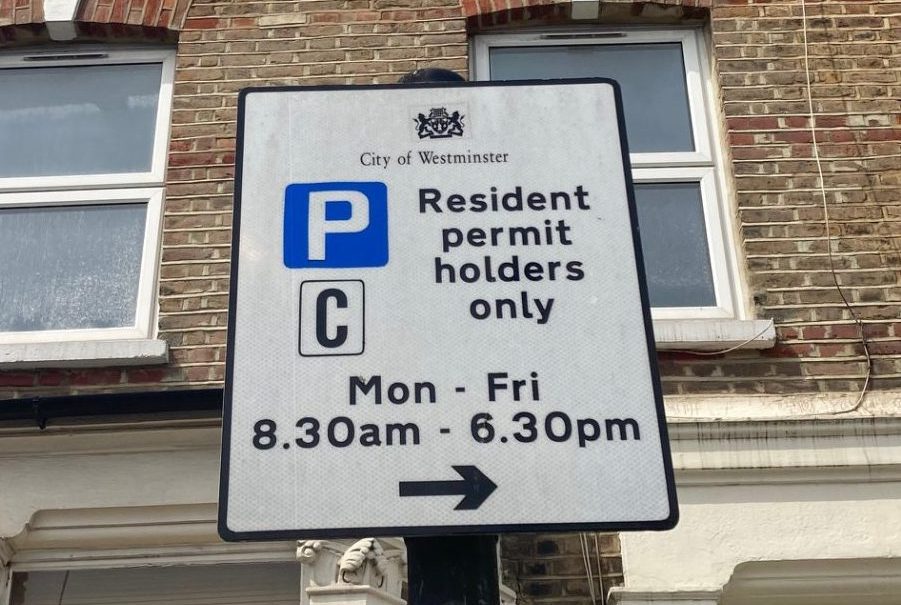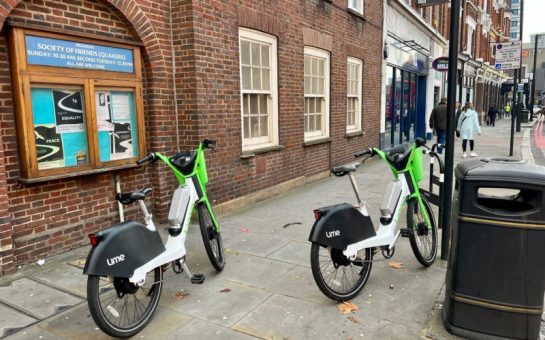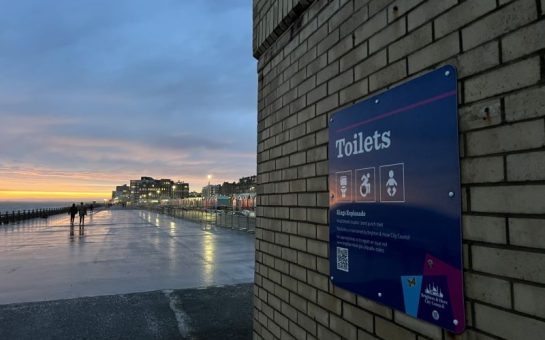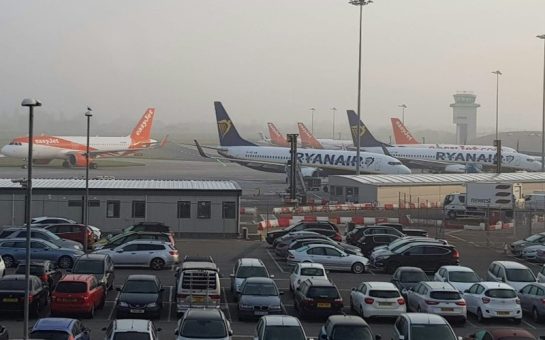Councils in central London could be missing out on millions of pounds in revenue because they are undercharging for residents’ parking permits, campaigners have claimed.
In a recent report entitled Parking Policy: Time for Change, countryside charity CPRE London claimed there is significant potential for increasing residents’ permit charges.
The report argued that, with public space at a premium in cities, using it to park private motor vehicles is both unfair and inefficient, which should be reflected in the price charged.
The report’s author, Alice Roberts, said: “We’ve enabled our public realm to be somewhere that can be rented out cheaply by private car owners to the exclusion of everyone else.
“In somewhere like Westminster, where the vast majority of trips are not made in a car, that seems hugely unreasonable.
“It’s wrong to charge out public space at exceptionally cheap rates. You are basically subsidising one small section of the community, which is likely to be better off anyway.
“If councils can charge more, they should, because it’s a valuable public resource.”
Improving roads and transport
With a modest increase in permit charges, the borough of Westminster could be earning an extra £36m a year from residents’ parking charges.
The boroughs of Camden, Southwark and Kensington & Chelsea could boost revenue by amounts ranging from £11m to £19m.
This income would, by law, have to be spent on improving roads and transport in the boroughs.
Campaigners believe it could be spent on improving transport for all residents and achieving key policy objectives.
The CPRE London report states: “Parking policy is key to combatting the climate crisis, improving air quality and promoting active, shared and sustainable travel. It is one of the most effective tools local authorities can use to reduce car use and ownership.”
Across the four boroughs, residents’ parking permits are currently set by the council at prices ranging from £117 to £313, although rates for the most polluting vehicles, such as diesel, are higher.
Charges vary depending on engine size and CO2 emissions. The average charge for the least polluting and lowest-carbon-emitting vehicles across the boroughs is £153.50.
These rates are equivalent to between 32p and 85p per day or 4p and 10p per hour (based on 54 chargeable parking hours per week).
Table 1: Residents’ parking permit charges in Westminster, Camden, Kensington & Chelsea and Southwark per annum, per week and per hour*
| £ p.a. (low/high) | Equiv. to £ p.w. (low/high) | Equiv. to £ p.h. (low/high) | |
| Westminster | 118/166 | 2.26/3.19 | 0.04/0.05 |
| Camden | 146/327** | 2.80/6.28 | 0.05/0.10 |
| Kensington & Chelsea | 125/173 | 2.40/3.32 | 0.04/0.05 |
| Southwark | 225/300 | 4.32/5.76 | 0.07/0.09 |
** Not incl. most polluting vehicles
Even in the highest-charging boroughs, these rates are well below what the same councils charge for metred parking for non-residents.
Metred parking changes range from £2.38 per hour in Camden to £6.80 in Kensington & Chelsea.
The average low across the boroughs is £3.46 and the average high is £6.62.
Table 2: Metred parking charges per hour in Westminster, Camden, Kensington & Chelsea and Southwark
| £ p.h (low/high) | |
| Westminster | 4.22/5.80* |
| Camden | 2.38/6.63** |
| Kensington & Chelsea | 2.50/6.80 |
| Southwark | 4.75/7.25* |
** Not incl. diesel surcharge or highest tariff on bus routes
This results in significant discrepancies between residents’ parking and metred parking charges.
Fig. 1 Residents’ parking charges vs. metred parking charges Westminster, Camden, Kensington & Chelsea and Southwark
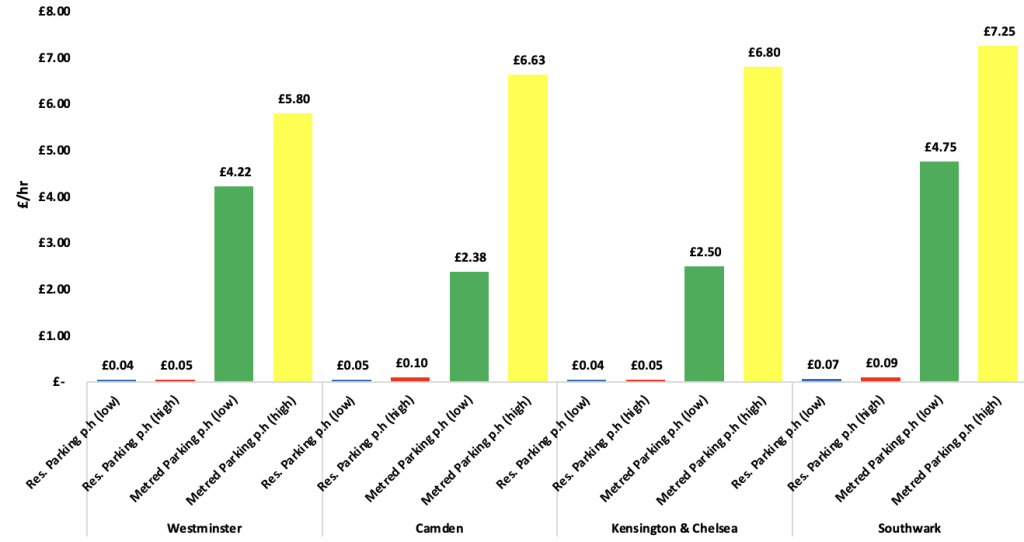
While increasing residents’ charges to a level more in line with metred charges would be politically unfeasible (in Westminster, a residents’ permit charged at metred rates would cost over £11,000 a year), even a small increase in resident permit charges would result in a substantial uplift in revenue.
In Westminster, increasing permit charges to just 10% of the cheapest metred parking would result in a permit charge of £1185 a year.
Similar rises in the other boroughs would result in permit charges of £668.30, £702 and £1333 respectively.
Table 3: Annual cost of residents’ parking permit adjusted to 10% of cheapest metred parking (based on 54 chargeable hours per week)
| Westminster | £1185 |
| Camden | £668.30 |
| Kensington & Chelsea | £702 |
| Southwark | £1333 |
In Westminster, this would raise an extra £36.3m a year to be invested in the borough’s roads and transport (based on the number of residents’ permits currently on issue multiplied by the difference between current and revised parking permit rates).
In Camden, Kensington & Chelsea and Southwark, the figures would be £11.4m, £19.3m and £13m respectively.
Fig 2: Current vs. potential revenue from residents’ parking
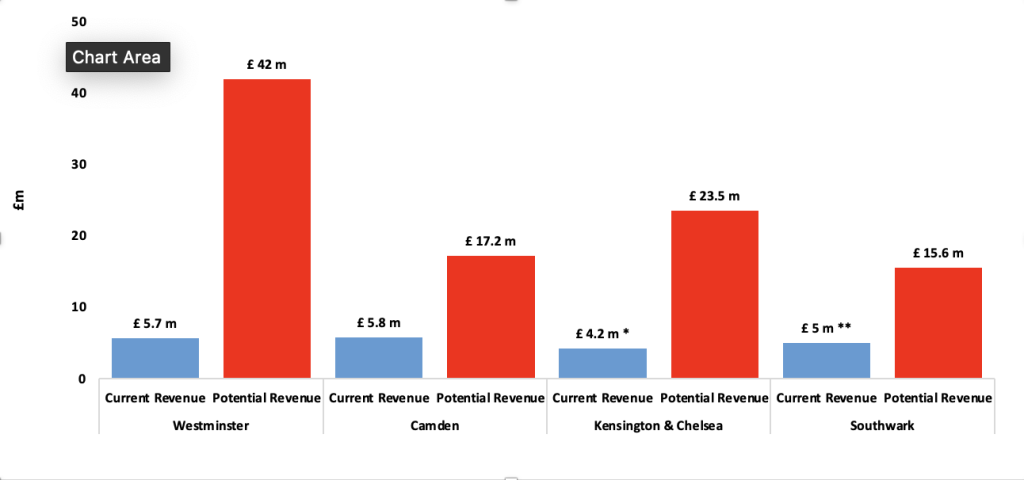
** 2019 figure
One tenth of market value
As the CPRE London report indicates, the issue of parking and how it is charged for by councils is beginning to come under increasing scrutiny from campaigners and urban planning experts.
In a report entitled Reclaim the Kerb: The Future of Parking and Kerbside Management, thinktank The Centre for London has shown that the average annual cost of a residents’ parking permit in the capital is around one tenth of its market value.
Equivalent parking spaces rented through commercial peer-to-peer parking websites such as JustPark can be ten times higher than prices charged by local authorities.
The development value of the land occupied by a typical parking space is significantly higher than what is charged by councils for residents’ parking – although the report concedes that kerbside space does not have same development value as non-kerbside space.
Most damningly, the report found that, across the capital, residents’ parking spaces do not even cover their own costs, which include the expenses involved in issuing and renewing permits and maintaining parking spaces and signage.
Table 4: Operating costs vs. revenue for residents’ parking permits in London
| Avg. annual operating costs per residents’ parking space (£) | Avg. annual cost of permit (£) | |
| Inner London | 336 | 51-230 |
| Outer London | 295 | 29-154 |
The report argues that residents’ parking spaces are in effect being subsidised by revenue from metred parking and council tax.
It calls for this parking revenue to be invested instead in better public transport and more walking and cycling.
Although by law councils cannot increase permit rates with the primary objective of creating a surplus, they can use those rates to manage congestion and the demand for parking, especially where such aims form part of their official policy.
The report states: “With reduced car usage and modal shift being central objectives of the mayoral Transport Strategy (and therefore of boroughs’ Local Implementation Plans), boroughs need to ensure that permit prices are set at a level that helps meet these objectives locally.”
None of the councils discussed in this article responded to a request for comment.
